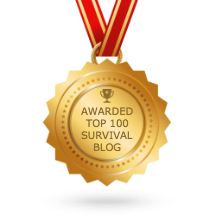 So you've stocked up on all the food you'll need after the end of
the world as we know it. You've got wheat, flour, dried foods, canned
foods, all kinds of food. But if the worst case scenario happens, will
you still have power? There might be power in some areas, but always
assume there won't be where you are. And if there isn't, how are you
going to cook all that food?
So you've stocked up on all the food you'll need after the end of
the world as we know it. You've got wheat, flour, dried foods, canned
foods, all kinds of food. But if the worst case scenario happens, will
you still have power? There might be power in some areas, but always
assume there won't be where you are. And if there isn't, how are you
going to cook all that food?In this modern age of TV dinners, frozen pizzas, canned soups and Hamburger Helper, many people never learned how to cook a meal the old-fashioned way. The majority of city-dwellers are dependent on microwaves, electric stoves, and toasters. But what will they do if the power goes out for an extended period? There are several options:
- Grill. This is the first and most obvious option. Hopefully you've stocked up on plenty of coal and/or propane. But if you don't have a grill or are out of coal and propane...
- Camping stove. Acquiring one of these should be a top priority. Coleman makes a great 2 burner stove that you can find on amazon.com. These, too, should always be used outdoors. Make sure you have plenty of Coleman fuel!
- Fireplace. Try roasting hot dogs and other solid foods on sticks in your fireplace. You can also wrap potatoes and other vegetables in foil and leave them in the fireplace to cook.
- Campfire. Who doesn't love cooking over a campfire? But you don't want to just roast hot dogs and marshmallows. With a good camp grill you'll be able to cook just about anything.
- Dutch oven. This is a cast iron pot that you hang over a fire. It's ideal for making soups, stews, and hot drinks. A 4-quart Dutch oven is less than $50. To hang it over the fire, you'll need a fireplace crane or a campfire tripod.
- Sterno stove. These are good for heating up drinks, canned foods such as chili, Spaghettios and soup. The best thing about them is they're portable, weighing less than a pound. I would get a good Sterno stove kit and some extra canned heat. Tip: Try putting your Sterno stove in a fire pit with a few handfuls of charcoal. This way you can grill while using very little charcoal.
- Kerosene heater. These are usually used for heating rooms, but are also a great way to boil beans, pasta and other foods or make hot drinks. If the top is flat, just set a pot of water on top. A good kerosene heater can cost over $100, but it's a great thing to add to your survival supplies, especially if you live in a cold climate.
- Grills should always be used outdoors and a safe distance from your home or shelter. The carbon monoxide can be deadly and a few stray sparks is all it takes to start a fire. Same goes for camp stoves.
- If you use a fireplace, make sure the flue is open and unobstructed. Don't use treated wood for a cooking fire.
- Never use gasoline to get a fire going.
- Make sure fires are controlled with metal or rocks surrounding them.
- Never leave a fire (not even a candle) without an adult to keep an eye on it.
After studying and practicing survivalism for years, Matthew
Zornes quit his job and became a full-time Internet Marketer, blogging
about self-help products and emergency preparedness at UrbanSurvivalSite.com.
Like most people, he lives in the city because of work, family and
other circumstances, but he believes it is possible to survive in the
city through all the most likely disasters. Download free eBooks and
articles from UrbanSurvivalSite.com.




0 comments:
Post a Comment